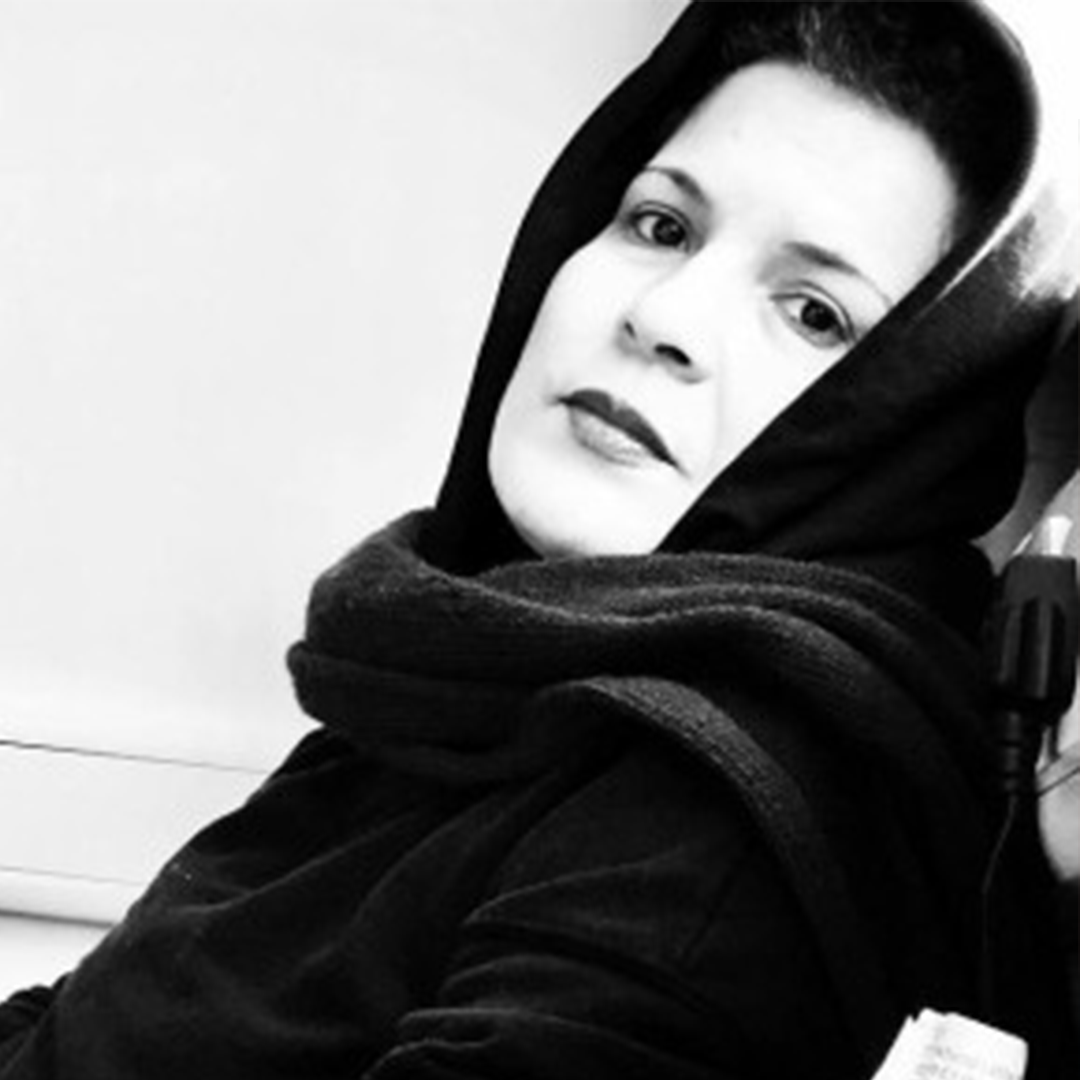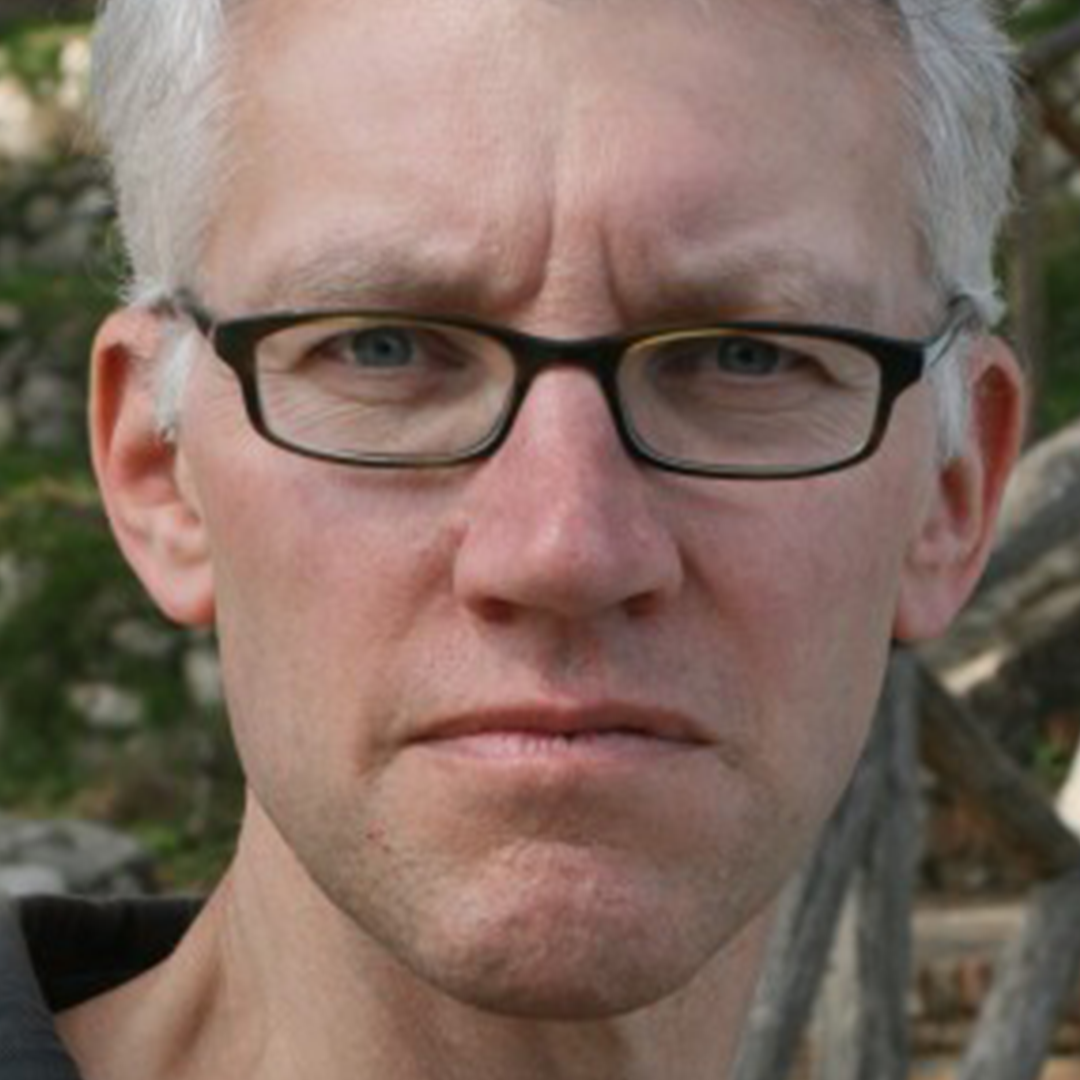17 Apr 2020 | Volume 49.01 Spring 2020, Volume 49.01 Spring 2020 Extras
Our Index on Censorship spring 2020 podcast features the Miami Herald journalist Mary Ellen Klas talking about being denied access to a press briefing in Florida on coronavirus and how reporting in the country under Trump has become even more difficult in the crisis, Moa Petersén, senior lecturer at Lund University, discusses the Swedish microchipping phenomenon, while the journalist Noelle Mateer speaks about living in China as everyone around her embraced surveillance cameras.
Print copies of the magazine are available on Amazon, or you can take out a digital subscription via Exact Editions. Each magazine sale helps Index on Censorship continue its fight for free expression worldwide.
30 Mar 2020 | Magazine, Magazine Contents, Volume 49.01 Spring 2020
[vc_row][vc_column][vc_custom_heading text=”With contributions from Ak Welsapar, Julian Baggini, Alison Flood, Jean-Paul Marthoz and Victoria Pavlova”][/vc_column][/vc_row][vc_row][vc_column][vc_column_text]
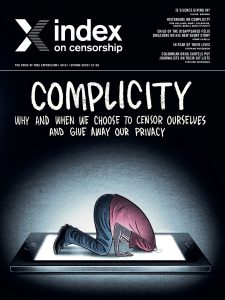 The Spring 2020 issue of Index on Censorship magazine looks at our own role in free speech violations. In this issue we talk to Swedish people who are willingly having microchips inserted under their skin. Noelle Mateer writes about living in China as her neighbours, and her landlord, embraced video surveillance cameras. The historian Tom Holland highlights the best examples from the past of people willing to self-censor. Jemimah Steinfeld discusses holding back from difficult conversations at the dinner table, alongside interviewing Helen Lewis on one of the most heated conversations of today. And Steven Borowiec asks why a North Korean is protesting against the current South Korean government. Plus Mark Frary tests the popular apps to see how much data you are knowingly – or unknowingly – giving away.
The Spring 2020 issue of Index on Censorship magazine looks at our own role in free speech violations. In this issue we talk to Swedish people who are willingly having microchips inserted under their skin. Noelle Mateer writes about living in China as her neighbours, and her landlord, embraced video surveillance cameras. The historian Tom Holland highlights the best examples from the past of people willing to self-censor. Jemimah Steinfeld discusses holding back from difficult conversations at the dinner table, alongside interviewing Helen Lewis on one of the most heated conversations of today. And Steven Borowiec asks why a North Korean is protesting against the current South Korean government. Plus Mark Frary tests the popular apps to see how much data you are knowingly – or unknowingly – giving away.
In our In Focus section, we sit down with different generations of people from Turkey and China and discuss with them what they can and cannot talk about today compared to the past. We also look at how as world demand for cocaine grows, journalists in Colombia are increasingly under threat. Finally, is internet browsing biased against LBGTQ stories? A special Index investigation.
Our culture section contains an exclusive short story from Libyan writer Najwa Bin Shatwan about an author changing her story to people please, as well as stories from Argentina and Bangladesh.
[/vc_column_text][/vc_column][/vc_row][vc_row][vc_column][vc_custom_heading text=”Special Report”][/vc_column][/vc_row][vc_row][vc_column][vc_column_text]Willingly watched by Noelle Mateer: Chinese people are installing their own video cameras as they believe losing privacy is a price they are willing to pay for enhanced safety
The big deal by Jean-Paul Marthoz: French journalists past and present have felt pressure to conform to the view of the tribe in their reporting
Don’t let them call the tune by Jeffrey Wasserstrom: A professor debates the moral questions about speaking at events sponsored by an organisation with links to the Chinese government
Chipping away at our privacy by Nathalie Rothschild: Swedes are having microchips inserted under their skin. What does that mean for their privacy?
There’s nothing wrong with being scared by Kirsten Han: As a journalist from Singapore grows up, her views on those who have self-censored change
How to ruin a good dinner party by Jemimah Steinfeld: We’re told not to discuss sex, politics and religion at the dinner table, but what happens to our free speech when we give in to that rule?
Sshh… No speaking out by Alison Flood: Historians Tom Holland, Mary Fulbrook, Serhii Plokhy and Daniel Beer discuss the people from the past who were guilty of complicity
Making foes out of friends by Steven Borowiec: North Korea’s grave human rights record is off the negotiation table in talks with South Korea. Why?
Nothing in life is free by Mark Frary: An investigation into how much information and privacy we are giving away on our phones
Not my turf by Jemimah Steinfeld: Helen Lewis argues that vitriol around the trans debate means only extreme voices are being heard
Stripsearch by Martin Rowson: You’ve just signed away your freedom to dream in private
Driven towards the exit by Victoria Pavlova: As Bulgarian media is bought up by those with ties to the government, journalists are being forced out of the industry
Shadowing the golden age of Soviet censorship by Ak Welsapar: The Turkmen author discusses those who got in bed with the old regime, and what’s happening now
Silent majority by Stefano Pozzebon: A culture of fear has taken over Venezuela, where people are facing prison for being critical
Academically challenged by Kaya Genç: A Turkish academic who worried about publicly criticising the government hit a tipping point once her name was faked on a petition
Unhealthy market by Charlotte Middlehurst: As coronavirus affects China’s economy, will a weaker market mean international companies have more power to stand up for freedom of expression?
When silence is not enough by Julian Baggini: The philosopher ponders the dilemma of when you have to speak out and when it is OK not to[/vc_column_text][/vc_column][/vc_row][vc_row][vc_column][vc_custom_heading text=”In Focus”][vc_column_text]Generations apart by Kaya Genç and Karoline Kan: We sat down with Turkish and Chinese families to hear whether things really are that different between the generations when it comes to free speech
Crossing the line by Stephen Woodman: Cartels trading in cocaine are taking violent action to stop journalists reporting on them
A slap in the face by Alessio Perrone: Meet the Italian journalist who has had to fight over 126 lawsuits all aimed at silencing her
Con (census) by Jessica Ní Mhainín: Turns out national censuses are controversial, especially in the countries where information is most tightly controlled
The documentary Bolsonaro doesn’t want made by Rachael Jolley: Brazil’s president has pulled the plug on funding for the TV series Transversais. Why? We speak to the director and publish extracts from its pitch
Queer erasure by Andy Lee Roth and April Anderson: Internet browsing can be biased against LGBTQ people, new exclusive research shows[/vc_column_text][/vc_column][/vc_row][vc_row][vc_column][vc_custom_heading text=”Culture”][vc_column_text]Up in smoke by Félix Bruzzone: A semi-autobiographical story from the son of two of Argentina’s disappeared
Between the gavel and the anvil by Najwa Bin Shatwan: A new short story about a Libyan author who starts changing her story to please neighbours
We could all disappear by Neamat Imam: The Bangladesh novelist on why his next book is about a famous writer who disappeared in the 1970s[/vc_column_text][/vc_column][/vc_row][vc_row][vc_column][vc_custom_heading text=”Index around the world”][vc_column_text]Demand points of view by Orna Herr: A new Index initiative has allowed people to debate about all of the issues we’re otherwise avoiding[/vc_column_text][/vc_column][/vc_row][vc_row][vc_column][vc_custom_heading text=”Endnote”][vc_column_text]Ticking the boxes by Jemimah Steinfeld: Voter turnout has never felt more important and has led to many new organisations setting out to encourage this. But they face many obstacles[/vc_column_text][/vc_column][/vc_row][vc_row][vc_column width=”1/3″][vc_custom_heading text=”Subscribe”][vc_column_text]In print, online, in your mailbox, on your iPad.
Subscription options from £18 or just £1.49 in the App Store for a digital issue.
Every subscriber helps support Index on Censorship’s projects around the world.
 SUBSCRIBE NOW[/vc_column_text][/vc_column][vc_column width=”1/3″][vc_custom_heading text=”Read”][vc_column_text]The playwright Arthur Miller wrote an essay for Index in 1978 entitled The Sin of Power. We reproduce it for the first time on our website and theatre director Nicholas Hytner responds to it in the magazine
SUBSCRIBE NOW[/vc_column_text][/vc_column][vc_column width=”1/3″][vc_custom_heading text=”Read”][vc_column_text]The playwright Arthur Miller wrote an essay for Index in 1978 entitled The Sin of Power. We reproduce it for the first time on our website and theatre director Nicholas Hytner responds to it in the magazine
READ HERE[/vc_column_text][/vc_column][vc_column width=”1/3″][vc_custom_heading text=”Listen”][vc_column_text]In the Index on Censorship autumn 2019 podcast, we focus on how travel restrictions at borders are limiting the flow of free thought and ideas. Lewis Jennings and Sally Gimson talk to trans woman and activist Peppermint; San Diego photojournalist Ariana Drehsler and Index’s South Korean correspondent Steven Borowiec
LISTEN HERE[/vc_column_text][/vc_column][/vc_row]
24 Mar 2020 | Magazine, Magazine Editions, Volume 49.01 Spring 2020
Director
Émerson Maranhão is a Brazilian director and filmmaker, who has directed the short film Aqueles Dois, about two transgender men, amongst others
Writer
An award-winning Libyan academic and writer, Najwa Bin Shatwan has written three novels, a collection of short stories, plays and contributions to anthologies
Historian
Tom Holland is a writer and historian, who has published a range of bestselling books. He specialises in classical and medieval history
12 Mar 2020 | News, Student Reading Lists
[vc_row][vc_column][vc_column_text]In August 2019 the Indian government under Narendra Modi, leader of the the Hindu nationalist Bharatiya Janata Party, revoked Article 370 of the Indian constitution. The article had granted the state of Jammu and Kashmir the autonomy to write their own constitution and make their own laws. Since the article was revoked, residents of Jammu and Kashmir have been subjected to the world’s longest internet shutdown, a serious breach of their right to free expression and to access information. As the ban on high-speed internet continues, Index looks back on the history of freedom of expression in India, from the years following The Emergency, to the present.

Libya: Criticise & be killed, the December 1980 issue of Index on Censorship magazine
In 1975 Prime Minister Indira Gandhi was convicted of election malpractice conducted during her 1971 campaign. Despite this, she clung onto power and declared a state of emergency which lasted for 19 months, known as The Emergency. During this time, members of the political opposition were imprisoned and the press heavily censored. In this article written in 1980, the year Gandhi was re-elected, Michael Henderson questions if Indian journalists have a long enough memory and a robust enough spirit to stand up to a prime minister with a clear and recent track record of control of the press.
Read the full article[/vc_column_text][/vc_column][/vc_row][vc_row][vc_column][vc_column_text]

Black voices in South Africa, the December 1984 issue of Index on Censorship magazine
In 1984, George Theiner writes of an India still scarred by The Emergency and a visit to Index on Censorship by Mr Justice A N Grover, chairman of the Press Council of India, who took issue with the magazine’s continuing criticism of the Indian press. Theiner interviewed journalists about the future of democracy and a free press under Indira Gandhi. He found a mixture of those who were still in shock about the censorship during The Emergency, and those who were complacent in a belief that it couldn’t happen again. (The future of India under Gandhi came to be something of a moot point as, in October 1984, a few months after this article was published, she was assassinated by her own bodyguards.)
[/vc_column_text][vc_column_text][/vc_column_text][/vc_column][/vc_row][vc_row][vc_column][vc_column_text]
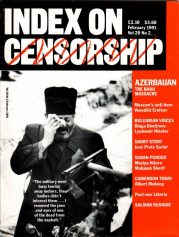
Azerbaijan: the Baku Massacre, the February 1991 issue of Index on Censorship magazine
In 1991 India had a free press… in newspapers. Television and radio were state-owned and state-exploited. Other innovative types of media became a political battleground, with opposition parties promising to release the government’s grip on a news outlet that was fast evolving. Sidharth Bhatia’s piece details the independent video magazines set up by journalists which had to be rented from a video shop. When these magazines became successful, reaching a wide audience and providing information not stifled by a state agenda, government censorship began to encroach upon them.
Read the full article [/vc_column_text][/vc_column][/vc_row][vc_row][vc_column][vc_column_text]
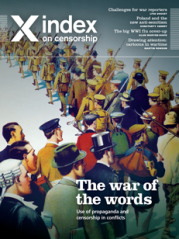
The war of the words, the March 2014 issue of Index on Censorship magazine
Prayaag Akbar examines the role the rich and powerful have in press censorship in India, but in this case it is wealthy business owners, rather than the government, who come under scrutiny. Media outlets who find themselves owned by a large business conglomerate, may then be under pressure to self-censor in order to avoid reporting negatively on the hand that feeds them. Akbar cites examples of the collision of business interests with journalistic integrity as the richest men in India buy up large portions of the national media groups.
Read the full article
[/vc_column_text][/vc_column][/vc_row][vc_row][vc_column][vc_column_text]
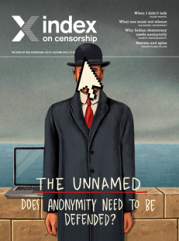
The unnamed, the September 2016 issue of Index on Censorship magazine
Is online anonymity allowing trolls to abuse women without consequences, or it is vital for the safety of those whose expression does not follow the party line? In 2016, as Twitter became more widely used in India, and issues of trolling became apparent, government ministers suggested removing the anonymity of trolls in a bid to increase accountability. Suhrith Parthasarathy reports on how state involvement with online expression could lead to the anonymity of activists being revoked to protect state interests.
Read the full article[/vc_column_text][/vc_column][/vc_row][vc_row][vc_column][vc_column_text]
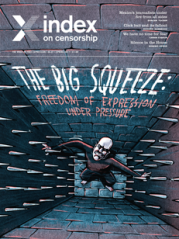
The Big Squeeze, the April 2017 issue of Index on Censorship magazine
In November 2016, a Supreme Court order made it obligatory to stand during the national anthem, which is played in Indian cinemas before the film begins, equating being patriotic with being a law-abiding citizen. Lawyer and writer Suhrith Parthasarathy examines the legal complexities of enforcing shows of patriotism in a country whose constitution guarantees freedom of expression, and speaks to people who have been subject to police interviews for choosing to stay seated.
Read the full article[/vc_column_text][/vc_column][/vc_row][vc_row][vc_column][vc_column_text]
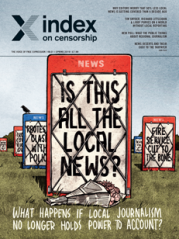
Is This All the Local News?, the April 2019 issue of Index on Censorship magazine
Rituparna Chatterjee reports on the importance of local news, and threats faced by local news journalists in India. Journalists working in rural parts of India can face pay too low to survive on, and can be susceptible to bribes from local police officers and politicians, keen to censor scandals. Chatterjee also highlights how tribal and indigenous communities can end up excluded from the national narrative of India when large media conglomerates do not report on issues in the areas they live in.
Read the full article[/vc_column_text][/vc_column][/vc_row][vc_row][vc_column][vc_column_text]
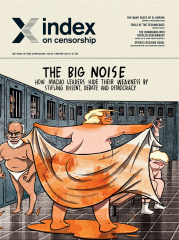
The Big Noise, the December 2019 issue of Index on Censorship magazine
The Emergency of 1975-1977 has been seen in later years as a blip in freedom of expression in India. However, since the election of Modi to prime minister in 2014, freedom of expression in India is taking a hit. Modi’s supporters are instilling fear and committing violence against those considered outsiders, often Muslims. Such violence is not being roundly condemned by their leader; his silence is taken as tacit approval. Meanwhile the internet shutdown imposed on Kashmir has not been fully lifted, an attack on access to information.
Read the full article[/vc_column_text][/vc_column][/vc_row]

 The Spring 2020 issue of Index on Censorship magazine looks at our own role in free speech violations. In this issue we talk to Swedish people who are willingly having microchips inserted under their skin. Noelle Mateer writes about living in China as her neighbours, and her landlord, embraced video surveillance cameras. The historian Tom Holland highlights the best examples from the past of people willing to self-censor. Jemimah Steinfeld discusses holding back from difficult conversations at the dinner table, alongside interviewing Helen Lewis on one of the most heated conversations of today. And Steven Borowiec asks why a North Korean is protesting against the current South Korean government. Plus Mark Frary tests the popular apps to see how much data you are knowingly – or unknowingly – giving away.
The Spring 2020 issue of Index on Censorship magazine looks at our own role in free speech violations. In this issue we talk to Swedish people who are willingly having microchips inserted under their skin. Noelle Mateer writes about living in China as her neighbours, and her landlord, embraced video surveillance cameras. The historian Tom Holland highlights the best examples from the past of people willing to self-censor. Jemimah Steinfeld discusses holding back from difficult conversations at the dinner table, alongside interviewing Helen Lewis on one of the most heated conversations of today. And Steven Borowiec asks why a North Korean is protesting against the current South Korean government. Plus Mark Frary tests the popular apps to see how much data you are knowingly – or unknowingly – giving away.
